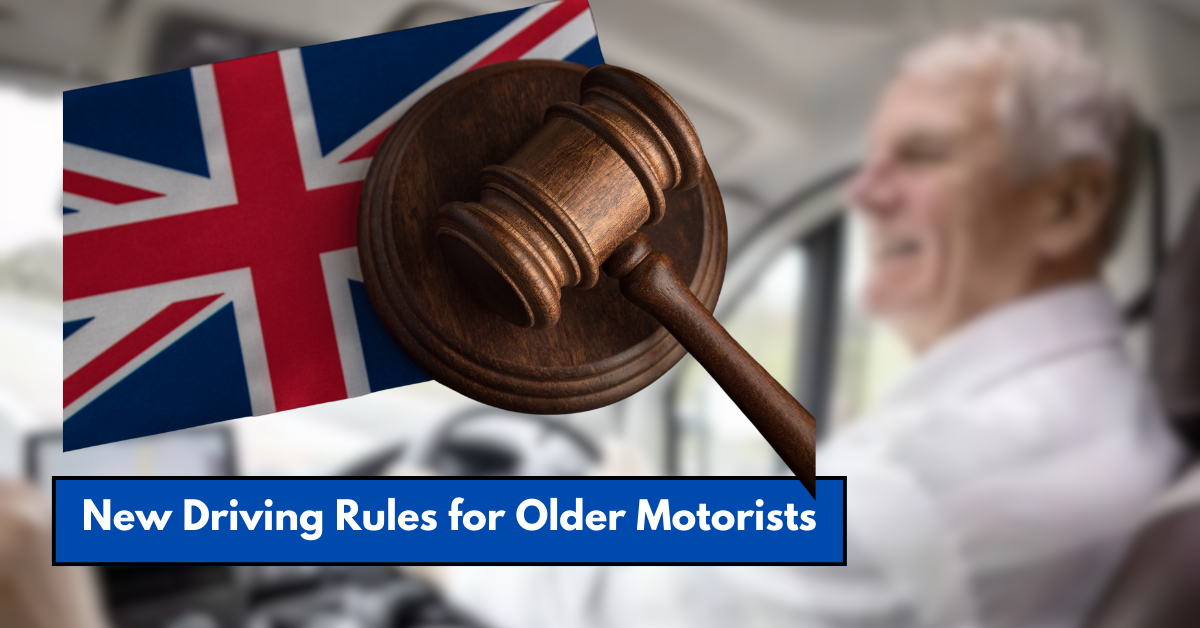In 2025, new driving laws in the UK will introduce significant changes for older drivers. These regulations aim to enhance road safety, ensure drivers are fit to be on the road, and address various issues such as vision, cognitive abilities, and insurance policies. Here’s a detailed look at the key updates and how they affect older motorists.
1. Graduated Driving Licences to Promote Safer Roads
A new Graduated Driving Licence (GDL) system is under consideration to ensure road safety for all. This system would introduce restrictions for new drivers, including limitations on night-time driving, passenger age groups, and stricter blood alcohol limits. Although primarily targeted at younger drivers, the GDL highlights the growing emphasis on maintaining safety standards for all age groups.
2. Regular Vision Assessments for Older Drivers
Clear vision is critical for safe driving. As part of the reforms, authorities are pushing for mandatory eyesight tests every two years for older drivers.
Currently, drivers aged 70 and above only need to declare that their eyesight is adequate when renewing their licences. However, experts argue this self-declaration might not be enough to detect deteriorating vision.
Rob Heard, founder of the Older Drivers Forum, stated: “Regular sight tests can help ensure safety on the road and identify medical conditions early. This not only benefits the driver but also other road users.”
Drivers are encouraged to visit optometrists regularly, even if they feel their eyesight is fine. Poor vision can lead to delayed reactions, difficulty in reading road signs, and accidents.
3. Cognitive Assessments for Drivers Aged 80+
Following the tragic death of a child caused by an elderly driver, authorities are considering cognitive testing for drivers over the age of 80. These assessments will evaluate mental sharpness and rule out issues like dementia, which could impair safe driving.
Sheriff Principal Nigel Ross suggested that no licence renewal for drivers aged 80 or above should occur without passing a cognitive test. This proposal aims to prevent accidents caused by cognitive decline in older motorists.
4. Fitness Assessments for Licence Renewals
In addition to vision and cognitive tests, older drivers may soon need to perform fitness assessments when renewing their licences. Currently, drivers aged 70 and above must renew their licence every three years by confirming their fitness to drive. The proposed changes could include a more comprehensive evaluation to ensure their physical and mental capabilities are suitable for road use.
Rob Heard emphasized:
“At the age of 70, renewing a licence should go beyond ticking a box. A proper assessment would help older drivers stay safe on the road.”
5. Vehicle Taxation Changes Impacting Older Drivers
From April 2025, new taxation rules will affect all drivers, including older motorists. Key changes include:
- Standard Vehicle Excise Duty increasing by £5 to £195 per year.
- First-year rates for high-emission petrol and diesel cars doubling.
- Older vehicles (1985-2001) facing additional annual costs of up to £20.
While these changes are not specific to older drivers, they are likely to impact those who own older cars or vehicles with higher emissions.
6. Insurance Price Hikes for Older Drivers
A recent petition highlights the rising cost of car insurance for drivers aged 70 and above. Many insurance providers are accused of charging higher premiums for older motorists, even when they have a good driving history. Additionally, drivers over 80 often struggle to find competitive quotes from online insurers.
Campaigners argue that this practice is discriminatory and are urging for a review of insurance policies. The goal is to ensure fair pricing and prevent unnecessary financial burdens on senior drivers.
7. The Importance of Staying Informed
With these changes coming into effect, older drivers must stay informed about their responsibilities and any required assessments. Regular check-ups for vision, cognitive abilities, and overall fitness will not only help them meet legal requirements but also keep them and others safe on the road.
Conclusion
The new driving laws for older drivers in 2025 are designed to balance road safety with the independence of senior motorists. By introducing measures like cognitive tests, mandatory vision assessments, and fitness evaluations, the UK aims to ensure that all drivers, regardless of age, are capable of driving safely.
Staying proactive about health, vehicle maintenance, and legal updates will help older drivers adapt to these changes seamlessly. Ultimately, these reforms are about creating safer roads for everyone.
This article has been carefully fact-checked by our editorial team to ensure accuracy and eliminate any misleading information. We are committed to maintaining the highest standards of integrity in our content.
Filza specializes in simplifying financial topics for everyday readers. Whether breaking down Canada’s tax guides or U.S. benefits like SNAP and VA Disability, Filza’s relatable writing style ensures readers feel confident and informed. Follow her insights on LinkedIn or reach out via email at shewrites.health@gmail.com.
